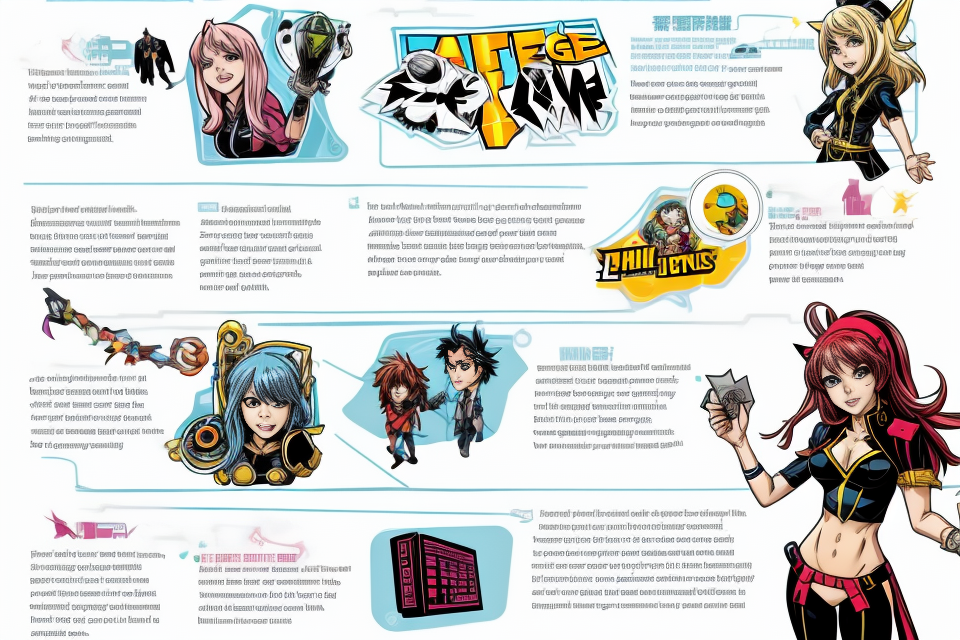Cosplay, short for “costume play,” is a popular hobby among fans of comic books, video games, and other forms of pop culture. But while cosplayers often spend hours crafting intricate costumes and perfecting their characters’ mannerisms, some may wonder if it’s legal to dress up as their favorite superhero or villain. In this comprehensive guide, we’ll explore the legalities of cosplay, including copyright law, trademark law, and the rights of public figures. Whether you’re a seasoned cosplayer or just starting out, this guide will help you understand the legal landscape of cosplay and how to protect yourself while having fun.
Understanding Cosplay and Its Popularity
The Rise of Cosplay as a Hobby
Cosplay, short for “costume play,” has been steadily gaining popularity over the past few decades. Originating in Japan in the 1980s, cosplay has since become a worldwide phenomenon, with devoted followers participating in conventions, online communities, and even creating their own cosplay-focused events. This section will delve into the reasons behind the rise of cosplay as a hobby and its impact on popular culture.
- Emergence of Pop Culture: The rise of cosplay can be attributed to the increasing importance of pop culture in our daily lives. With the advent of the internet, fans of various movies, TV shows, video games, and comic books have been able to connect with like-minded individuals, sharing their passion for their favorite franchises. This has led to a growth in cosplay as a way for fans to express their love for these characters and worlds.
- Accessibility and Creativity: The ease of access to information and resources has made it easier for cosplayers to create their costumes and props. With the availability of tutorials, online forums, and a growing market for cosplay materials, it has become more attainable for individuals to engage in cosplay regardless of their skill level or budget. This has encouraged creativity and self-expression, leading to an increase in the number of cosplayers.
- Acceptance and Celebration: Cosplay has been gradually accepted as a legitimate hobby, with more events and conventions being organized around the world. These events provide a platform for cosplayers to showcase their creations, interact with fellow enthusiasts, and even compete in contests. The increasing acceptance of cosplay has contributed to its rise as a popular hobby.
- Social Media and Online Communities: The rise of social media platforms has allowed cosplayers to share their work and connect with others who share their interests. Online communities dedicated to cosplay have formed, enabling cosplayers to exchange ideas, provide feedback, and share their experiences. This has further fueled the growth of cosplay as a hobby and a community.
- Influence on Pop Culture: The prominence of cosplay in pop culture has led to an increased representation of cosplayers in media, including TV shows, movies, and advertisements. This has contributed to the mainstream acceptance of cosplay and inspired more individuals to participate in the hobby.
In conclusion, the rise of cosplay as a hobby can be attributed to a combination of factors, including the growth of pop culture, increased accessibility and creativity, greater acceptance and celebration, the influence of social media and online communities, and its impact on pop culture itself. This rise has resulted in cosplay becoming a beloved and integral part of many fans’ lives, providing a unique form of self-expression and connection with others who share their passions.
Cosplay in Popular Culture
Cosplay has become increasingly popular in recent years, with events such as Comic-Con and Anime conventions drawing crowds of people dressed up as their favorite characters. Cosplay is a form of self-expression and creativity, where individuals use costumes, props, and accessories to portray a specific character or create a unique look.
In addition to being a popular hobby, cosplay has also made its way into mainstream media. Television shows such as “Heroes” and “The Big Bang Theory” have featured cosplayers, and movies like “Cosplay Killer” and “The Cosplaying Death Queen” have been released to critical acclaim. Cosplay has also been featured in music videos, such as “TikTok Cosplay” by Yodeling Kid.
However, as cosplay has gained popularity, so too have legal issues surrounding it. From copyright infringement to trademark disputes, cosplayers must be aware of the legal implications of their hobby. In the following sections, we will explore some of the legal issues that cosplayers may encounter and provide guidance on how to navigate these issues.
The Importance of Cosplay in Fan Communities
Cosplay, short for “costume play,” is a hobby where participants dress up as characters from various media such as anime, manga, video games, and movies. It has become increasingly popular over the years, especially in the age of social media where people can showcase their cosplay to a wider audience.
The importance of cosplay in fan communities cannot be overstated. It is a way for fans to express their love and admiration for their favorite characters and franchises. It also provides a platform for self-expression and creativity, as cosplayers get to showcase their skills in costume-making, sewing, and prop-making.
Moreover, cosplay is a form of socialization for many fans. It provides an opportunity to meet and interact with other fans who share the same interests. Cosplay events, such as conventions and gatherings, have become a staple in many fan communities, providing a space for fans to come together and celebrate their shared love for a particular franchise or character.
However, as cosplay has become more popular, the legalities surrounding it have become more complex. Cosplayers need to be aware of copyright laws, trademark laws, and other legal issues that may arise when creating and displaying their cosplay. This guide aims to provide a comprehensive understanding of the legalities of cosplay and how cosplayers can navigate these complex issues.
The Legal Framework Surrounding Cosplay
Intellectual Property Rights and Cosplay
When it comes to cosplay, the use of intellectual property (IP) is a critical aspect to consider. IP rights refer to the legal protections granted to creators of original works, such as inventions, literary and artistic works, and symbols, names, and images used in commerce.
Copyright Protection
Copyright protection is a form of IP that grants creators exclusive rights to reproduce, distribute, and display their work. In the context of cosplay, this means that cosplayers must be mindful of copyright laws when creating and displaying their costumes. For example, if a cosplayer creates a costume based on a copyrighted character, they may need to obtain permission from the copyright holder before displaying it publicly.
Trademark Protection
Trademark protection is another form of IP that is used to protect brand names, logos, and other distinctive marks. In the context of cosplay, this means that cosplayers must be careful not to use trademarked logos or symbols in their costumes without permission. For example, if a cosplayer creates a costume based on a brand’s logo, they may need to obtain permission from the trademark holder before displaying it publicly.
Publicity Rights
Publicity rights are a form of IP that protect a person’s right to control the commercial use of their name, likeness, or image. In the context of cosplay, this means that cosplayers must be mindful of publicity rights laws when creating and displaying their costumes. For example, if a cosplayer creates a costume based on a real person, they may need to obtain permission from the person before displaying it publicly.
It is important to note that the laws surrounding IP and cosplay can be complex and vary depending on the jurisdiction. Therefore, it is advisable for cosplayers to consult with legal professionals to ensure that they are in compliance with all applicable laws and regulations.
Trademark and Copyright Infringement in Cosplay
Cosplayers often use trademarked and copyrighted materials in their costumes and props, which can lead to legal issues. It is important for cosplayers to understand the legal implications of their actions and how to avoid infringement.
Trademark Infringement
Trademarks are used to identify the source of a product or service and to distinguish it from others. Trademark infringement occurs when someone uses a trademark without permission and in a way that is likely to cause confusion among consumers. In the context of cosplay, this can occur when a cosplayer uses a costume or prop that bears a trademarked logo or design without permission.
Copyright Infringement
Copyright law protects original works of authorship, such as literature, music, and art. In the context of cosplay, copyright infringement can occur when a cosplayer uses a copyrighted character or design without permission. This can include using copyrighted images or references in their costumes or props.
Fair Use
Fair use is a legal doctrine that allows for the use of copyrighted material for certain purposes, such as criticism, commentary, or education. In the context of cosplay, fair use may apply if a cosplayer is using copyrighted material for a transformative purpose, such as creating a parody or satire of the original work. However, fair use is a complex legal concept and should be carefully considered before using copyrighted material in cosplay.
Licensing
In some cases, cosplayers may be able to obtain a license to use trademarked or copyrighted material in their cosplay. Licensing agreements can be obtained from the owners of the trademark or copyright, and can provide cosplayers with the legal right to use the material in their cosplay.
It is important for cosplayers to be aware of the legal implications of using trademarked and copyrighted material in their cosplay. By understanding the laws surrounding trademark and copyright infringement, cosplayers can avoid legal issues and enjoy their hobby without fear of legal repercussions.
The Role of Consent in Cosplay
When it comes to cosplay, one of the most important aspects to consider is the concept of consent. Consent refers to the permission that is given by one party to another for a specific action to be taken. In the context of cosplay, consent is particularly important when it comes to using copyrighted material or depicting characters in a certain way.
One of the main legal frameworks surrounding cosplay is the fair use doctrine. Fair use is a legal doctrine that allows for the use of copyrighted material for certain purposes, such as criticism, commentary, news reporting, teaching, scholarship, or research. However, the concept of fair use can be complex and is often subject to interpretation by courts.
In addition to fair use, there are other legal considerations that cosplayers should be aware of when it comes to using copyrighted material. For example, trademark law protects certain symbols, logos, and names that are associated with specific brands or products. If a cosplayer were to use a trademarked symbol or logo in their cosplay, they could potentially face legal action.
Another important aspect of consent in cosplay is the depiction of certain characters or scenarios. For example, if a cosplayer were to depict a character in a sexualized manner, they could potentially face backlash from the character’s creators or fans. Additionally, if a cosplayer were to depict a character in a way that is inconsistent with the character’s established traits or backstory, they could face criticism from fans of the character.
In conclusion, the role of consent in cosplay is a complex issue that cosplayers should be aware of when creating their costumes and props. While the fair use doctrine allows for certain uses of copyrighted material, cosplayers should be mindful of other legal considerations such as trademark law and the potential for backlash from fans or creators. Additionally, cosplayers should be respectful of the characters and scenarios they depict, and ensure that their portrayal is consistent with the established canon of the character.
Legal Implications of Selling Cosplay Items
Selling cosplay items can have legal implications that cosplayers should be aware of. It is important to understand the legal framework surrounding the sale of cosplay items to avoid any legal issues.
- Copyright Law
- Cosplayers should be aware of copyright laws when selling cosplay items.
- Using copyrighted material without permission can result in legal action.
- Cosplayers should ensure that they have the necessary permissions or licenses to sell items that are based on copyrighted material.
- Trademark Law
- Trademark laws also apply to cosplay items.
- Selling items that bear a trademarked logo or design without permission can result in legal action.
- Cosplayers should ensure that they have the necessary permissions or licenses to sell items that bear trademarked logos or designs.
- Intellectual Property Rights
- Intellectual property rights also apply to cosplay items.
- Cosplayers should ensure that they do not infringe on someone else’s intellectual property rights when creating or selling cosplay items.
- This includes ensuring that they do not use copyrighted or trademarked material without permission, and that they do not create items that are identical to existing products.
- Sales Tax
- Cosplayers who sell items online may be required to collect sales tax.
- The amount of sales tax that must be collected will vary depending on the location of the seller and the buyer.
- Cosplayers should research the sales tax laws in their location to ensure that they are complying with all applicable laws.
In summary, cosplayers who sell items should be aware of the legal implications of their actions. They should ensure that they have the necessary permissions or licenses to sell items that are based on copyrighted or trademarked material, and that they do not infringe on someone else’s intellectual property rights. Additionally, they should research the sales tax laws in their location to ensure that they are complying with all applicable laws.
Navigating Cosplay Events and Conventions
Cosplay Event Organizers’ Responsibilities
Legal Obligations of Cosplay Event Organizers
Cosplay event organizers have a legal responsibility to ensure that their events are safe and enjoyable for all attendees. This includes complying with local laws and regulations, as well as taking steps to prevent accidents and injuries. Some of the legal obligations of cosplay event organizers include:
- Obtaining necessary permits and licenses
- Providing adequate security and emergency medical services
- Ensuring that the venue is accessible to people with disabilities
- Implementing rules and policies to prevent harassment and discrimination
- Providing clear and accurate information about the event, including schedules, ticket prices, and safety guidelines
Liability for Injuries and Damages
Cosplay event organizers can be held liable for injuries and damages that occur during their events. This includes physical injuries, property damage, and financial losses. In order to avoid liability, organizers should take steps to prevent accidents and injuries, such as providing adequate lighting and security, maintaining the venue in a safe condition, and implementing rules and policies to prevent accidents.
Intellectual Property Rights
Cosplay event organizers must also be aware of intellectual property rights when it comes to the use of copyrighted materials in cosplay. This includes costumes, props, and other items that may be protected by copyright or trademark laws. Organizers should ensure that they have the necessary permissions or licenses to use these materials, or risk being sued for copyright infringement.
Contractual Obligations
Cosplay event organizers may also have contractual obligations to attendees, vendors, and other parties involved in the event. This includes agreements regarding payment, services provided, and other terms and conditions of participation. Organizers should ensure that they understand and comply with these obligations in order to avoid legal disputes and financial losses.
In summary, cosplay event organizers have a range of legal obligations and responsibilities that they must comply with in order to ensure a safe and successful event. By understanding these obligations and taking steps to prevent accidents and injuries, organizers can avoid liability and protect their businesses from legal disputes.
Dealing with Copyright and Trademark Issues at Conventions
Cosplay events and conventions are a significant part of the cosplay community, and they can be a lot of fun for those who attend. However, when it comes to dealing with copyright and trademark issues, it’s important to be aware of the legalities involved. Here are some key points to keep in mind:
- Copyright and trademark laws apply to cosplay: Even though cosplay is a form of expression, it’s important to remember that copyright and trademark laws still apply. This means that you can’t use copyrighted or trademarked material without permission, even if you’re using it for cosplay purposes.
- Understanding fair use: Fair use is a legal doctrine that allows for limited use of copyrighted material without permission. However, it’s important to understand that fair use is a complex and often confusing area of law, and it’s not always clear what is and isn’t allowed.
- Obtaining permission: If you want to use copyrighted or trademarked material in your cosplay, it’s best to obtain permission from the owner. This can be a time-consuming process, but it’s the safest way to avoid legal issues down the line.
- Avoiding infringement: To avoid copyright and trademark infringement, it’s important to be aware of what you can and can’t use in your cosplay. This means staying away from using logos, brand names, or other protected material in your cosplay, unless you have permission.
- Understanding cosplay-specific laws: Some countries have specific laws that apply to cosplay, such as Japan’s “Cosplay Law,” which allows for the use of copyrighted material in cosplay, as long as it’s for non-commercial purposes. It’s important to research and understand any such laws that may apply to your cosplay activities.
By being aware of these legalities and taking steps to avoid copyright and trademark infringement, you can help ensure that your cosplay experiences are both fun and legal.
The Importance of Respecting Cosplay Boundaries
As cosplay becomes increasingly popular, it is important to understand and respect the boundaries that come with it. These boundaries can vary from event to event, but there are some general guidelines that should be followed.
Personal Boundaries
Personal boundaries refer to an individual’s physical and emotional limits. It is important to respect a cosplayer’s personal boundaries, including their comfort with physical contact and their preferences for taking photos.
- Physical Contact: It is important to ask for permission before initiating any physical contact, such as hugging or touching. Some cosplayers may be comfortable with physical contact, while others may not. Respect their wishes and ask for permission before taking any action.
- Photo Preferences: Some cosplayers may be open to taking photos with fans, while others may not. It is important to respect their wishes and ask for permission before taking any photos.
Intellectual Property Boundaries
Intellectual property boundaries refer to the legal rights of the creators of the characters and franchises that cosplayers portray. It is important to respect these rights and avoid infringing on them.
- Copyright Law: Copyright law protects the intellectual property of creators. It is important to avoid using copyrighted material without permission, as this can result in legal consequences.
- Trademark Law: Trademark law protects the brand identity of creators. It is important to avoid using trademarked material without permission, as this can result in legal consequences.
Costume Boundaries
Costume boundaries refer to the rules and regulations surrounding the creation and use of cosplay costumes. It is important to respect these boundaries to avoid any legal consequences.
- Prop Restrictions: Some events may have restrictions on the types of props that can be brought in. It is important to check the rules and regulations before bringing any props to an event.
- Nudity Restrictions: Some events may have restrictions on the amount of skin that can be shown in cosplay costumes. It is important to check the rules and regulations before creating or wearing a cosplay costume.
In conclusion, it is important to respect the boundaries of cosplay, including personal boundaries, intellectual property boundaries, and costume boundaries. By doing so, cosplayers can ensure that they are able to enjoy their hobby without any legal consequences.
Cosplay and Public Performance Rights
Cosplay and Public Performance Rights are two concepts that are often intertwined, particularly in the context of cosplay events and conventions. Understanding these rights is crucial for cosplayers who want to participate in public events, as they need to be aware of the legal implications of their actions.
In the United States, copyright law grants creators exclusive rights over their works, including the right to publicly perform them. This means that if a cosplayer wants to perform a copyrighted character’s songs or dialogues, they need to obtain permission from the copyright holder. Failure to do so can result in legal consequences, including fines and lawsuits.
However, there are some exceptions to this rule. For example, if a cosplayer is performing at a non-profit event, they may be able to argue that their performance falls under fair use, which allows for limited use of copyrighted material without permission. Additionally, if a cosplayer is creating their own original character, they do not need to worry about obtaining permission to perform their own creation.
It is important to note that the laws surrounding public performance rights can vary depending on the country and region. Cosplayers should familiarize themselves with the laws in their jurisdiction and obtain legal advice if necessary.
Additionally, cosplayers should also be aware of the policies of the event they are participating in. Some events may have their own rules and regulations regarding copyright and public performance rights, and cosplayers should make sure they comply with these policies to avoid any legal issues.
In summary, cosplayers should be aware of the legal implications of public performance rights and take steps to ensure they are complying with the laws and policies of the events they participate in. By doing so, they can avoid legal consequences and continue to enjoy their passion for cosplay.
Addressing Legal Issues in Cosplay
Reporting Infringement and Legal Violations
Filing a Copyright Infringement Report
In the realm of cosplay, it is essential to recognize that intellectual property rights, such as copyrights, play a significant role in safeguarding the creative works of designers, artists, and authors. Consequently, should you encounter instances of copyright infringement, it is crucial to know the proper procedures for reporting such violations.
The first step in addressing copyright infringement in cosplay is to familiarize yourself with the relevant laws and regulations governing intellectual property rights. The United States Copyright Office, for instance, provides a comprehensive guide on filing a copyright infringement report. This guide can be found on their official website and serves as an invaluable resource for individuals seeking to protect their intellectual property rights.
In order to file a copyright infringement report, it is necessary to gather specific information regarding the alleged infringement. This information typically includes the copyright owner’s contact details, the specific work that has been infringed upon, and the location and nature of the infringement. It is also essential to provide evidence supporting the claim of infringement, such as photographs or screenshots of the alleged violation.
Upon gathering the necessary information, the next step is to submit a formal complaint to the designated authority. In the United States, this authority is typically the Copyright Office, which is responsible for investigating and adjudicating claims of copyright infringement. The process of filing a complaint may vary depending on the jurisdiction, and it is recommended to consult with a legal professional for guidance on the specific procedures applicable in your area.
Reporting Trademark and Patent Infringement
In addition to copyright infringement, trademark and patent violations are also prevalent concerns in the cosplay community. Trademark infringement occurs when an individual or entity uses a mark that is identical or confusingly similar to a registered trademark without the permission of the trademark owner. Patent infringement, on the other hand, occurs when a person or entity makes, uses, imports, offers for sale, or sells any patented invention without the permission of the patent holder.
Reporting instances of trademark or patent infringement typically follows a similar process to that of copyright infringement. It is crucial to gather evidence supporting the claim of infringement and submit a formal complaint to the appropriate authority. In the United States, this authority is typically the United States Patent and Trademark Office (USPTO), which is responsible for investigating and adjudicating claims of trademark and patent infringement.
In conclusion, reporting instances of infringement and legal violations in cosplay is a critical aspect of protecting intellectual property rights. By understanding the legal frameworks governing copyright, trademark, and patent law, cosplayers can take the necessary steps to safeguard their creative works and ensure that the cosplay community remains a vibrant and creative space for all.
Working with Lawyers and Legal Teams in Cosplay
Collaborating with legal professionals can provide valuable insights and support in navigating the complexities of cosplay law. Here are some key points to consider when working with lawyers and legal teams in cosplay:
- Identifying Legal Issues: Cosplay lawyers can help identify potential legal concerns in your cosplay activities, such as intellectual property violations, defamation, or privacy infringements. They can provide guidance on how to avoid or address these issues, reducing the risk of legal disputes.
- Drafting Contracts and Agreements: Lawyers can assist in drafting contracts and agreements for your cosplay business or collaborations. This includes contracts with clients, vendors, and other parties involved in your cosplay activities. A lawyer can ensure that these agreements are legally binding and protect your interests.
- Providing Legal Advice: Cosplay lawyers can offer advice on legal matters related to your cosplay activities. This includes interpreting laws and regulations, explaining legal rights and obligations, and recommending courses of action in specific situations. They can help you make informed decisions that align with your business goals and values.
- Representing You in Legal Disputes: If you find yourself involved in a legal dispute related to cosplay, a lawyer can represent you in court or through alternative dispute resolution methods. They can negotiate on your behalf, draft legal documents, and advocate for your interests in legal proceedings.
- Staying Up-to-Date with Cosplay Law Developments: Cosplay law is constantly evolving, and it’s essential to stay informed about changes in legislation and case law. Lawyers can help you stay up-to-date with the latest developments and adjust your cosplay activities accordingly.
- Protecting Your Intellectual Property: If you create original cosplay designs or content, a lawyer can help you protect your intellectual property through trademarks, copyrights, and other legal mechanisms. They can also advise you on how to enforce your intellectual property rights if they are infringed upon by others.
- Addressing Privacy Concerns: Cosplay often involves taking and sharing photos and videos. Lawyers can help you navigate privacy concerns and ensure that you are not violating the privacy rights of others. They can also advise you on how to respond to privacy complaints or legal threats related to your cosplay activities.
In summary, working with lawyers and legal teams in cosplay can provide valuable support and guidance in addressing legal issues and ensuring compliance with cosplay laws. They can help you avoid legal disputes, protect your interests, and make informed decisions in your cosplay activities.
Cosplay and Online Communities: Navigating Legal Challenges
Cosplay and online communities are closely intertwined, with social media platforms and forums serving as a hub for cosplay enthusiasts to share their work, connect with others, and gain inspiration. However, this also presents unique legal challenges that cosplayers must navigate.
Intellectual Property
One of the most significant legal issues facing cosplayers is intellectual property (IP) law. Cosplayers must be mindful of the copyright and trademark laws that govern the use of copyrighted material in their costumes and props.
- Copyright: Cosplayers should avoid copying or distributing copyrighted material without permission from the copyright holder. This includes images, logos, and designs that are protected by copyright.
- Trademark: Cosplayers should also avoid using trademarked names or logos in their costumes or props, as this can lead to legal issues.
Right of Publicity
Another legal issue that cosplayers must be aware of is the right of publicity. This is the legal right of a person to control the commercial use of their name, likeness, or other identifying characteristics.
- Cosplayers should avoid using the names, likenesses, or other identifying characteristics of copyrighted characters without permission from the copyright holder.
Cyberbullying and Online Harassment
Cosplayers who participate in online communities must also be aware of the risk of cyberbullying and online harassment. Cosplayers should be cautious when sharing personal information online and should report any instances of harassment to the appropriate authorities.
- Cosplayers should be mindful of the potential risks of sharing personal information online and should take steps to protect their privacy.
- Cosplayers should report any instances of harassment to the appropriate authorities, such as the website administrator or law enforcement.
In conclusion, cosplayers must navigate a variety of legal challenges when participating in online communities. By being mindful of intellectual property and right of publicity laws, cosplayers can avoid legal issues and enjoy their hobby without fear of legal repercussions. Additionally, cosplayers should take steps to protect their privacy and report any instances of cyberbullying or online harassment.
The Future of Cosplay and Its Legal Framework
As cosplay continues to gain popularity and evolve, so too must the legal framework that governs it. Here are some potential developments to watch for in the future of cosplay and its legal framework:
- Increased Intellectual Property Protection: As cosplay becomes more mainstream, it is likely that intellectual property owners will take a closer look at the ways in which their properties are being used in cosplay. This could lead to increased enforcement of intellectual property rights, particularly with regard to trademark and copyright infringement.
- Greater Focus on Public Performance Rights: As cosplay events become more commercialized, there may be a greater focus on obtaining public performance rights for music and other copyrighted material used in cosplay performances. This could lead to increased scrutiny of the use of copyrighted material in cosplay, and the need for cosplayers to obtain permission or licenses in order to use such material.
- Evolving Definition of “Transformation”: The legal definition of “transformation” in cosplay may continue to evolve, as courts and regulatory bodies grapple with the question of how much modification is necessary to create a new work that is protected by fair use. This could have significant implications for cosplayers who create more transformative works, and may require greater attention to the legal boundaries of fair use.
- Greater Clarity on “Noncommercial” Use: The concept of “noncommercial” use is central to many of the legal protections afforded to cosplayers, but there is still some ambiguity around what constitutes commercial use. As cosplay becomes more commercialized, there may be a greater need for clarity around this issue, and for courts and regulatory bodies to provide guidance on what types of activities constitute commercial use.
- Increased Attention to Consent and Privacy: As cosplayers continue to create and share content online, there may be greater attention to issues of consent and privacy. This could lead to increased scrutiny of the use of photographs and other personal information in cosplay, and the need for cosplayers to obtain consent from subjects before sharing their images online.
Overall, the future of cosplay and its legal framework is likely to be shaped by a complex interplay of factors, including the evolving nature of the cosplay community, the increasing commercialization of cosplay events, and the ongoing evolution of intellectual property and privacy law. As such, it will be important for cosplayers to stay informed about these developments, and to be mindful of the legal boundaries of their activities.
FAQs
1. What is cosplay?
Cosplay, short for “costume play,” is a hobby where people dress up and act out characters from comic books, movies, video games, and other forms of popular culture.
2. Why is cosplay legal?
Cosplay is legal because it is a form of self-expression and creativity. People are allowed to dress up as their favorite characters and create their own costumes as long as they are not causing harm to others or breaking any laws.
3. Can I use copyrighted material in my cosplay?
Using copyrighted material in your cosplay can be a gray area. It is generally not recommended to use copyrighted material without permission from the copyright holder. However, if the copyrighted material is in the public domain or the use is considered fair use, then it may be legal to use it in your cosplay.
4. Is it legal to sell cosplay items?
Selling cosplay items can be legal as long as the items are not copied or infringing on someone else’s intellectual property. Many cosplayers create their own costumes and accessories, and selling these items is a way to make a living or supplement their income.
5. Can I use someone else’s cosplay design without permission?
No, it is not legal to use someone else’s cosplay design without permission. This is considered intellectual property theft and can result in legal consequences.
6. Can I use a real weapon as part of my cosplay?
No, it is not legal to use real weapons as part of your cosplay. This can be dangerous and can result in legal consequences. It is recommended to use prop weapons or non-functional replicas instead.
7. Can I cosplay as a character from a different culture?
Yes, you can cosplay as a character from a different culture as long as you are respectful and mindful of cultural appropriation. It is important to research and understand the culture you are cosplaying and to avoid using offensive stereotypes or caricatures.
8. Can I cosplay as a historical figure?
Yes, you can cosplay as a historical figure as long as you are mindful of the context and accuracy of your costume. It is important to research and understand the time period and culture of the historical figure you are cosplaying and to avoid using offensive stereotypes or caricatures.









